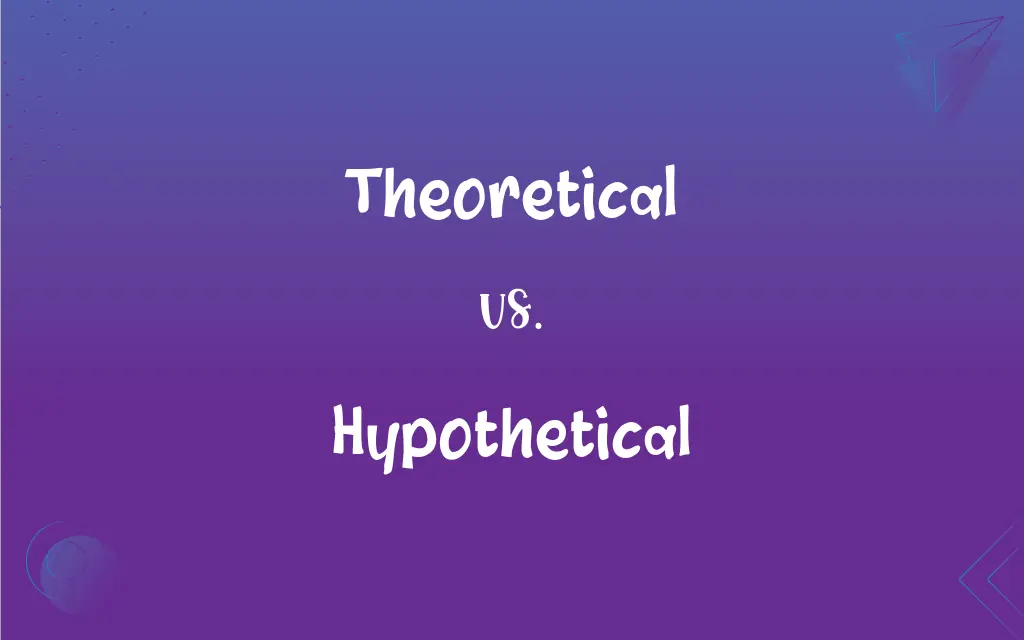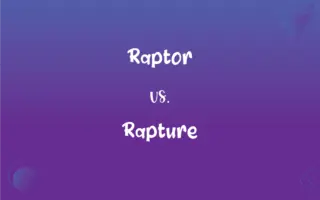Theoretical vs. Hypothetical: What's the Difference?
Edited by Aimie Carlson || By Janet White || Updated on October 7, 2023
Theoretical pertains to understanding based on systematic principles, while Hypothetical relates to a proposition or situation based on conjecture.

Key Differences
Theoretical and Hypothetical are terms that often intertwine in discussions, but they serve distinct purposes. Theoretical focuses on concepts and ideas rooted in systematic principles and established knowledge. When one talks of the theoretical aspect of a topic, they are referring to the framework or foundation upon which understanding is built. Theoretical knowledge, thus, isn’t necessarily based on direct experience but on general rules.
Conversely, Hypothetical pertains to scenarios that are imagined or speculated upon. Hypothetical situations haven't occurred but are envisioned to discuss potential outcomes. When one presents a hypothetical question, they are probing what might happen under certain conditions, without claiming that these conditions currently exist.
While Theoretical elements aim to explain phenomena based on existing theories or principles, Hypothetical constructs play a role in exploring "what-ifs." For instance, a theoretical understanding of physics might explain how gravity functions, whereas a hypothetical situation might ask what would occur if gravity were half as strong.
In science and research, theoretical frameworks guide investigations, offering models or predictions. Hypothetical scenarios, on the other hand, are instrumental in devising experiments or tests. Scientists might set up a hypothetical situation to validate or challenge theoretical knowledge.
To illustrate further, one might have a theoretical understanding of economic principles, but when discussing the potential effects of a future policy change, they'd be delving into the hypothetical realm.
ADVERTISEMENT
Comparison Chart
Basis
Systematic principles and established knowledge.
Imagined or speculated scenarios.
Focus
Understanding based on general rules.
Exploring "what-ifs" or possible outcomes.
Use in Research
Guides investigations with models or predictions.
Devises experiments to validate/challenge theories.
Nature
Pertains to theory and framework.
Relates to untested or unobserved scenarios.
Application
Explains phenomena based on existing theories.
Ponders outcomes of specific conditions or changes.
ADVERTISEMENT
Theoretical and Hypothetical Definitions
Theoretical
Based on systematic principles and not always on practical application.
His approach was purely Theoretical, lacking real-world testing.
Hypothetical
Assumed without concrete evidence for the sake of argument.
Her paper began with a Hypothetical premise, then explored its implications.
Theoretical
Concerned with theories rather than their practical application.
While his ideas were Theoretical, they inspired innovative designs.
Hypothetical
Representing an unobserved or untested scenario or condition.
Their strategy was based on several Hypothetical outcomes.
Theoretical
Explaining or understanding phenomena through general principles.
The Theoretical study provided insights, but fieldwork was essential.
Hypothetical
Imagined for the purpose of discussion or analysis.
The debate revolved around a Hypothetical situation of alien contact.
Theoretical
Deriving from established knowledge and not from practice.
The program provided both Theoretical and hands-on training.
Hypothetical
Based on conjecture and not actual evidence.
He presented a Hypothetical scenario where the market crashes.
Theoretical
Pertaining to the foundation or framework of a subject.
The Theoretical aspects of physics fascinated her.
Hypothetical
Describing a proposition that requires validation.
He posed a Hypothetical question to gauge her reaction.
Theoretical
Of, relating to, or based on theory.
Hypothetical
Of, relating to, or based on a hypothesis
A hypothetical situation.
Theoretical
Restricted to theory; not practical or applied
Theoretical physics.
Hypothetical
Conditional; contingent
The hypothetical meaning of a clause beginning with if.
Theoretical
Studying or working to develop theory.
Hypothetical
A hypothetical circumstance, condition, scenario, or situation
OK, let's consider this possibility then—just as a hypothetical.
Theoretical
Of or relating to theory; abstract; not empirical.
Hypothetical
Based upon a hypothesis; conjectural
Theoretical
Concerned primarily with theories or hypotheses rather than practical considerations;
Theoretical science
Hypothetical
(philosophy) conditional; contingent upon some hypothesis/antecedent
Theoretical
Concerned with theories rather than their practical applications;
Theoretical physics
Hypothetical
A possible or hypothetical situation or proposition
These hypotheticals serve no purpose until we have more information.
Theoretical
Based on specialized theory;
A theoretical analysis
Hypothetical
Based on hypothesis;
A hypothetical situation
The site of a hypothetical colony
FAQs
How is Hypothetical commonly used?
Hypothetical is used to describe imagined scenarios or propositions for the sake of discussion or analysis.
Can something be both Theoretical and Hypothetical?
Yes, a concept can be theoretically based and still pose hypothetical situations for exploration.
Is Theoretical learning sufficient for practical jobs?
While Theoretical learning provides foundational knowledge, practical experience is often necessary for job applications.
How do researchers use Theoretical frameworks?
Researchers use Theoretical frameworks to guide investigations and provide predictions or models.
Are all Hypothetical scenarios impossible?
No, while Hypothetical scenarios are unobserved or untested, they can sometimes materialize in the future.
Why are Hypothetical scenarios important in research?
Hypothetical scenarios allow researchers to explore potential outcomes and design experiments to test theories.
Is Theoretical knowledge always accurate?
While Theoretical knowledge is based on established principles, real-world applications can sometimes yield unexpected results.
Are Hypothetical situations real?
Hypothetical situations are imagined or speculated upon and are not considered real occurrences.
What does Theoretical pertain to?
Theoretical pertains to understanding based on systematic principles and not necessarily practical application.
Can Hypothetical questions have definitive answers?
Not always. Hypothetical questions often lead to speculative answers since they deal with unobserved scenarios.
How can one differentiate between Theoretical and Hypothetical in a discussion?
Theoretical discussions focus on established principles, while Hypothetical ones explore "what-ifs" or potential scenarios.
Why is Theoretical knowledge emphasized in academia?
Theoretical knowledge offers foundational understanding and principles, which are essential for deeper learning and research.
Does Theoretical always oppose practical?
No, Theoretical provides the foundation, while practical application puts theory to the test.
What's the value of discussing Hypothetical situations?
Discussing Hypothetical situations aids in preparedness, foresight, and understanding potential consequences.
Can a Theoretical concept ever become outdated?
Yes, as knowledge evolves, some Theoretical concepts may be revised or replaced with newer understandings.
About Author
Written by
Janet WhiteJanet White has been an esteemed writer and blogger for Difference Wiki. Holding a Master's degree in Science and Medical Journalism from the prestigious Boston University, she has consistently demonstrated her expertise and passion for her field. When she's not immersed in her work, Janet relishes her time exercising, delving into a good book, and cherishing moments with friends and family.
Edited by
Aimie CarlsonAimie Carlson, holding a master's degree in English literature, is a fervent English language enthusiast. She lends her writing talents to Difference Wiki, a prominent website that specializes in comparisons, offering readers insightful analyses that both captivate and inform.































































